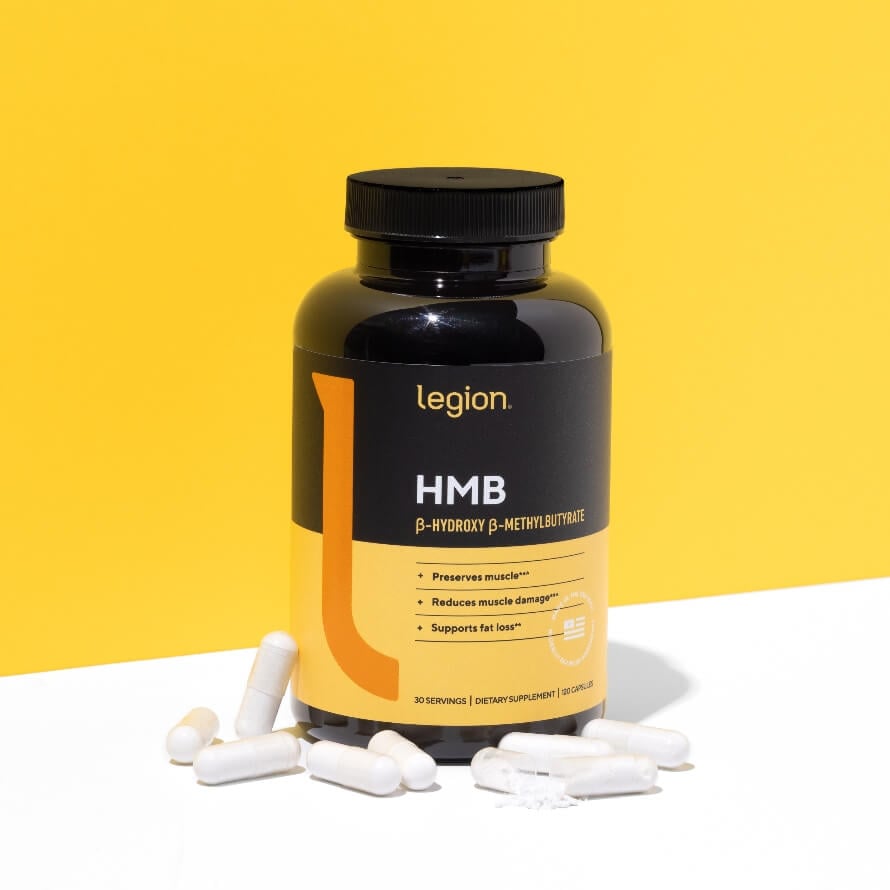HMB is a compound your body makes when it breaks down the amino acid leucine. Supplementing with it offers several benefits, including preserving muscle while dieting, reducing soreness, and promoting fat loss.
HMB is one of the most talked-about supplements on the market, with many marketers claiming it boosts muscle growth, fat loss, recovery, performance, and more.
In reality, most of those claims are overblown. That’s not to say HMB is a dud—it does have real, research-backed benefits, particularly for people looking to preserve their hard-earned muscle while dieting, during periods of intense training, or when injured.
In this article, you’ll learn what HMB is, how it works, what science actually says about HMB’s benefits, and how to take it for best results.
Key Takeaways
- HMB is a compound your body makes when it breaks down the amino acid leucine.
- HMB supplements are popular because they help reduce muscle breakdown, which can preserve muscle while dieting, during periods of unusually intense training, or when recovering from injury.
- HMB may also reduce muscle damage after exercise and support fat loss when combined with strength training and a calorie-controlled diet.
- The clinically effective dose of HMB is 2–3 grams. Take it 15–30 minutes before fasted training, or split it into three doses daily if you’re using it longer-term.
- There are no reported side effects of taking HMB.
- For a HMB supplement containing a clinically effective dose, no artificial food dyes, fillers, or other unnecessary junk, and tested for purity and potency in a third-party lab, try Legion’s HMB.
What Is HMB?

HMB stands for beta-hydroxy beta-methylbutyrate (also written β-Hydroxy β-Methylbutyrate). It’s a substance your body produces when it breaks down the amino acid leucine.
Your body only makes a small amount of HMB, which is why people who want to get HMB’s benefits choose to take supplements.
HMB Supplements
Scientists have known about HMB for over a century, but it wasn’t used as a supplement until the 1990s, when researchers studying leucine’s effects on muscle growth and recovery found that HMB was likely behind many of them.
Since then, people have taken HMB supplements believing that they boost muscle growth, endurance, and power, support recovery, and reduce muscle breakdown—especially during times when muscle loss is more likely (like while cutting or training fasted).
And if you believe the marketing hype, HMB can do all of that and more.
Unfortunately, not all of these claims hold up. Here’s what science actually says about HMB’s benefits.
HMB Benefits

Here’s a breakdown of the main HMB supplement benefits backed by science.
Reduces Muscle Loss
HMB’s most reliable benefit is that it helps prevent muscle breakdown. That makes it especially useful any time your body is more likely to lose muscle—during cutting phases, fasted training, or when you’re injured and unable to exercise, for example.
Evidence of this comes from a study published in the Journal of Applied Physiology. Researchers gave men up to 3 grams of HMB powder per day while they followed a strength training program. Compared to a placebo, HMB significantly reduced muscle loss and helped them gain more lean mass and strength.
Another study published in the Journal of Physiology found that taking just 2.4 grams of HMB powder daily lowered muscle protein breakdown by 57% in healthy young men—and it worked without increasing insulin, a hormone that normally helps prevent muscle loss.
That means HMB may help preserve muscle even when insulin is low—like during fasted training.
Reduces Muscle Damage
Another well-supported benefit of HMB is that it helps reduce muscle damage after training.
For example, in a study by Iowa State University, long-distance runners took 3 grams of HMB per day for 6 weeks before completing a 20-kilometer race. After the race, the runners taking HMB had 17% lower creatine kinase (CK) and 10% lower lactate dehydrogenase levels—two markers of muscle damage.
Another study from Kingston University had participants take HMB (combined with α-ketoisocaproic acid) for two weeks before a punishing biceps workout.
The result showed that those taking HMB powder lost less strength, had a smaller rise in CK levels, reported less soreness 24 hours after the workout, and experienced less swelling in the biceps than the placebo group.
May Increase Fat Loss
Some evidence suggests that HMB might help with fat loss—especially when paired with resistance training and a calorie-controlled diet.
For example, in one study published in the American Journal of Clinical Nutrition, women followed one of three plans: a normal eating schedule (control group), time-restricted feeding (TRF), or TRF combined with 3 grams of HMB per day (TRF+HMB).
All the women lifted weights and consumed the same number of calories and amount of protein for 8 weeks.
Because many dieters didn’t stick to their plans closely, the overall results showed little of note. But when the researchers focused on those who did follow the protocol, they found clear differences in fat loss: the control group gained 2% body fat, the TRF group lost 2–4%, and the TRF+HMB group lost 4–7%.
In other words, among those who stuck to the protocol, adding HMB nearly doubled fat loss compared to those who didn’t supplement.
In another study published in Experimental Gerontology, elderly men took either a placebo or 3 grams of HMB powder per day for 12 weeks. Some also did strength training, while others didn’t.
Only the group that combined HMB with training experienced significant fat loss, reducing abdominal fat by nearly 10%. The other groups, by comparison, saw no meaningful changes.
HMB Dosage
HMB dosing isn’t complicated, but the best approach depends on how you’re using it.
Here’s what you need to know.
How Much HMB Should You Take?
Most research shows that taking 2–3 grams of HMB per day is enough to reduce muscle breakdown.
That’s the dose used in nearly every study on HMB’s anti-catabolic (muscle-sparing) effects.
When to Take HMB
If you’re taking HMB before fasted training to reduce muscle breakdown, one dose of 1–3 grams about 15–30 minutes before training is all you need.
If you want to use HMB over a longer stretch—during a long cut, an intense training block, or while recovering from injury—research suggests it may be more effective to take 3 grams per day split into three equal doses, starting at least two weeks before the period of stress or inactivity.
This helps keep blood levels steady and may enhance HMB’s protective effects over time.
HMB Side Effects
Research shows that HMB is safe, even at high doses. No human studies using 3–6 grams per day have reported adverse side effects.
What’s more, animal studies have found taking HMB causes no harm even at doses ranging from 8–5,000 milligrams per kilogram of body weight per day for up to 16 weeks.
For a 200-pound person, that’s the equivalent of taking over 450 grams of HMB daily, which is far beyond any dose you’ll find in an HMB supplement.
All of which suggests that taking a few grams of HMB per day is well within safe limits.
The Best HMB Supplement

Many HMB supplements use generic, underdosed ingredients and include unnecessary fillers or proprietary blends that hide what you’re really getting.
Legion’s HMB is different.
Each serving contains 3 grams of myHMB®, a patented form of β-Hydroxy β-Methylbutyrate backed by over 50 peer-reviewed studies supporting its safety and efficacy.
It also contains no artificial dyes, fillers, or other unnecessary junk, and it’s tested for purity and potency in an ISO 17025–accredited third-party lab and certified free from contaminants and banned substances.
In other words, if you want an HMB supplement that’s properly dosed, research-backed, and transparently made, try Legion’s HMB.
FAQ #1: Is HMB an amino acid?
No—HMB isn’t an amino acid, but a compound your body makes when it breaks down the amino acid leucine. More technically, it’s a “metabolite” of leucine, meaning it’s produced as your body processes that amino acid.
Because your body only creates a small amount of HMB naturally, some people choose to supplement with it to get its full muscle-preserving and recovery-enhancing benefits.
FAQ #2: What does HMB do?
HMB helps reduce muscle breakdown, support recovery, and may even aid fat loss. It’s not a “muscle-building supplement” in the traditional sense, but its muscle-sparing effects are especially helpful during times when your body is under stress, like while cutting, training fasted, or recovering from injury.
FAQ #3: Is HMB bad for your liver?
No—there’s no evidence that HMB harms the liver in healthy people.
Human studies using up to 6 grams per day have found no adverse effects, and animal research shows HMB is safe even at extremely high doses—up to 5,000 mg per kilogram of body weight per day, which is far beyond anything you’d get from a supplement.
FAQ #4: Is there a link between HMB and hair loss?
No—there’s no evidence that HMB causes hair loss.
None of the clinical studies on HMB report hair loss as a side effect, even at doses up to 6 grams per day. There’s also no plausible biological mechanism linking HMB to hair loss.
FAQ #5: Should you take HMB before or after a workout?
If you’re taking HMB to reduce muscle breakdown before fasted training, take 1–3 grams about 15–30 minutes before your workout.
If you’re using HMB daily during a cut, intense training block, or bedrest, it may be more effective to take 3 grams per day split into three equal doses, starting at least two weeks before the period of stress.
Scientific References +
- Kaczka, Piotr, et al. “Mechanism of Action and the Effect of Beta-Hydroxy-Beta-Methylbutyrate (HMB) Supplementation on Different Types of Physical Performance - a Systematic Review.” Journal of Human Kinetics, vol. 68, 2019, pp. 211–222, www.ncbi.nlm.nih.gov/pubmed/31531146, https://doi.org/10.2478/hukin-2019-0070. Accessed 21 Nov. 2019.
- Wilson, Jacob M., et al. “β-Hydroxy-β-Methylbutyrate Free Acid Reduces Markers of Exercise-Induced Muscle Damage and Improves Recovery in Resistance-Trained Men.” British Journal of Nutrition, vol. 110, no. 3, 3 Jan. 2013, pp. 538–544, https://doi.org/10.1017/s0007114512005387. Accessed 22 July 2020.
- Panton, Lynn B, et al. “Nutritional Supplementation of the Leucine Metabolite β-Hydroxy-β-Methylbutyrate (Hmb) during Resistance Training.” Nutrition, vol. 16, no. 9, Sept. 2000, pp. 734–739, https://doi.org/10.1016/s0899-9007(00)00376-2. Accessed 26 Apr. 2020.
- Cruz-Jentoft, A. J., et al. “Prevalence of and Interventions for Sarcopenia in Ageing Adults: A Systematic Review. Report of the International Sarcopenia Initiative (EWGSOP and IWGS).” Age and Ageing, vol. 43, no. 6, 21 Sept. 2014, pp. 748–759, https://doi.org/10.1093/ageing/afu115.
- Nissen, S., et al. “Effect of Leucine Metabolite β-Hydroxy-β-Methylbutyrate on Muscle Metabolism during Resistance-Exercise Training.” Journal of Applied Physiology, vol. 81, no. 5, 1 Nov. 1996, pp. 2095–2104, https://doi.org/10.1152/jappl.1996.81.5.2095. Accessed 30 Nov. 2020.
- Wilkinson, D J, et al. “Effects of Leucine and Its Metabolite β-Hydroxy-β-Methylbutyrate on Human Skeletal Muscle Protein Metabolism.” The Journal of Physiology, vol. 591, no. 11, 2013, pp. 2911–23, www.ncbi.nlm.nih.gov/pubmed/23551944/, https://doi.org/10.1113/jphysiol.2013.253203. Accessed 9 June 2019.
- Knitter, A. E., et al. “Effects of β-Hydroxy-β-Methylbutyrate on Muscle Damage after a Prolonged Run.” Journal of Applied Physiology, vol. 89, no. 4, 1 Oct. 2000, pp. 1340–1344, https://doi.org/10.1152/jappl.2000.89.4.1340. Accessed 2 Aug. 2020.
- van Someren, Ken A., et al. “Supplementation with β-Hydroxy- β-Methylbutyrate (HMB) and α-Ketoisocaproic Acid (KIC) Reduces Signs and Symptoms of Exercise-Induced Muscle Damage in Man.” International Journal of Sport Nutrition and Exercise Metabolism, vol. 15, no. 4, Aug. 2005, pp. 413–424, https://doi.org/10.1123/ijsnem.15.4.413. Accessed 19 Aug. 2019.
- Tinsley, Grant M, et al. “Time-Restricted Feeding plus Resistance Training in Active Females: A Randomized Trial.” The American Journal of Clinical Nutrition, vol. 110, no. 3, 3 July 2019, pp. 628–640, https://doi.org/10.1093/ajcn/nqz126.
- Stout, Jeffrey R, et al. “β-Hydroxy-β-Methylbutyrate (HMB) Supplementation and Resistance Exercise Significantly Reduce Abdominal Adiposity in Healthy Elderly Men.” Experimental Gerontology, vol. 64, 17 Feb. 2015, pp. 33–34, https://doi.org/10.1016/j.exger.2015.02.012. Accessed 31 Jan. 2025.
- Wilson, Jacob M, et al. “International Society of Sports Nutrition Position Stand: Beta-Hydroxy-Beta-Methylbutyrate (HMB).” Journal of the International Society of Sports Nutrition, vol. 10, no. 1, 2 Feb. 2013, https://doi.org/10.1186/1550-2783-10-6. Accessed 22 Mar. 2019.
- Wilson, Gabriel J, et al. “Effects of Beta-Hydroxy-Beta-Methylbutyrate (HMB) on Exercise Performance and Body Composition across Varying Levels of Age, Sex, and Training Experience: A Review.” Nutrition & Metabolism, vol. 5, no. 1, 3 Jan. 2008, https://doi.org/10.1186/1743-7075-5-1. Accessed 19 Aug. 2019.










